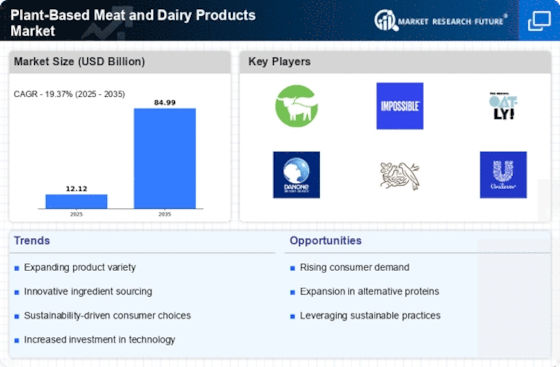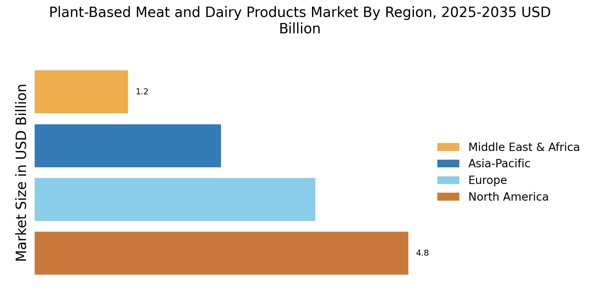Health Consciousness Drives Demand
The increasing awareness of health and wellness among consumers appears to be a primary driver for the Plant-Based Meat and dairy Products Market. As individuals become more informed about the health risks associated with traditional meat and dairy consumption, they are gravitating towards plant-based alternatives. Research indicates that the plant-based food sector has experienced a notable growth rate, with sales projected to reach approximately 74 billion dollars by 2027. This shift is not merely a trend; it reflects a fundamental change in dietary preferences, as consumers seek options that align with their health goals. The Plant-Based Meat and Dairy Products Market is thus positioned to benefit from this growing demand for healthier food choices, as more individuals prioritize nutrition and well-being in their dietary decisions.
Rising Vegan and Flexitarian Trends
The rise of veganism and flexitarianism is significantly impacting the Plant-Based Meat and Dairy Products Market. As more individuals adopt flexible dietary patterns that include plant-based options, the demand for meat and dairy alternatives is expected to increase. Surveys indicate that a substantial percentage of consumers are reducing their meat intake, with many identifying as flexitarians who prioritize plant-based foods while occasionally consuming animal products. This trend is not limited to a specific demographic; it spans various age groups and lifestyles, suggesting a widespread shift in eating habits. The Plant-Based Meat and Dairy Products Market is thus well-positioned to cater to this growing segment, offering a diverse range of products that appeal to both vegans and those seeking to incorporate more plant-based options into their diets.
Sustainability and Ethical Considerations
Sustainability concerns are increasingly influencing consumer choices, thereby driving the Plant-Based Meat and Dairy Products Market. The environmental impact of animal agriculture, including greenhouse gas emissions and resource depletion, has prompted consumers to seek more sustainable food options. Reports suggest that plant-based diets can significantly reduce an individual's carbon footprint, making them an appealing choice for environmentally conscious consumers. As awareness of climate change and ethical treatment of animals grows, the demand for plant-based products is likely to rise. The Plant-Based Meat and Dairy Products Market stands to gain from this shift, as brands that emphasize sustainability and ethical sourcing resonate with a demographic that values responsible consumption.
Technological Innovations Enhance Product Appeal
Technological advancements in food production are playing a crucial role in shaping the Plant-Based Meat and Dairy Products Market. Innovations such as improved flavor profiles, texture enhancements, and nutritional fortification are making plant-based products more appealing to a broader audience. For instance, the development of new processing techniques allows manufacturers to create plant-based meats that closely mimic the taste and texture of traditional meat. This has led to a surge in consumer acceptance, with many individuals willing to try these alternatives. The market for plant-based dairy products is also benefiting from similar innovations, as companies strive to replicate the creamy textures and flavors of conventional dairy. As these technologies continue to evolve, the Plant-Based Meat and Dairy Products Market is likely to experience sustained growth.
Increased Retail Availability and Marketing Efforts
The expansion of retail channels and targeted marketing strategies are driving the growth of the Plant-Based Meat and Dairy Products Market. As more supermarkets and specialty stores stock plant-based products, consumers have greater access to these alternatives. This increased availability is complemented by effective marketing campaigns that highlight the benefits of plant-based diets. Brands are leveraging social media and influencer partnerships to reach a wider audience, effectively communicating the advantages of choosing plant-based options. Data suggests that the visibility of plant-based products in retail settings correlates with increased consumer purchases. Consequently, the Plant-Based Meat and Dairy Products Market is likely to continue its upward trajectory as accessibility and awareness improve.


















